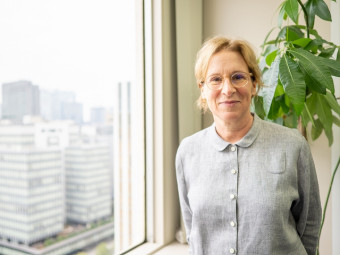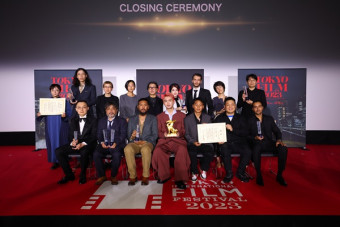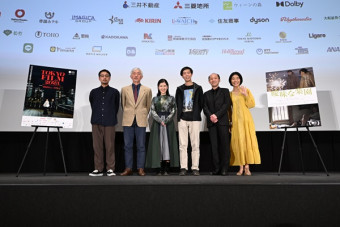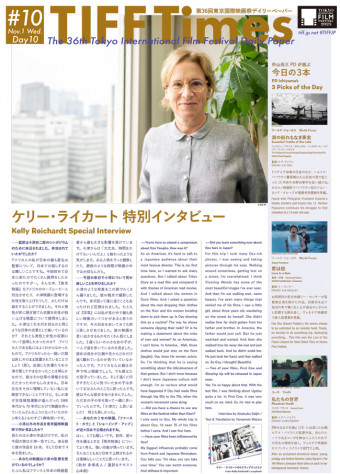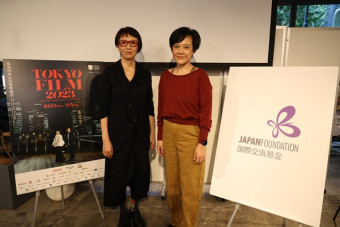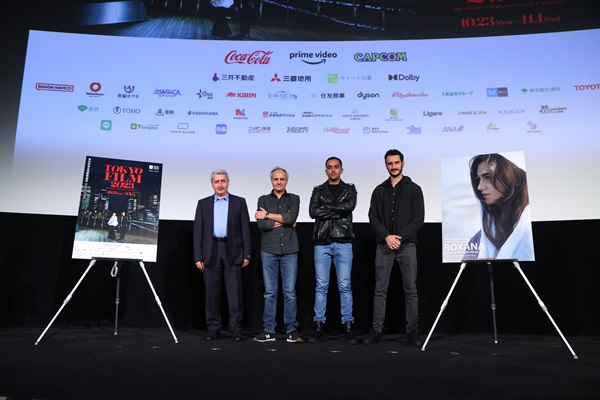
At the October 25 Q&A session for Parviz Shahbazi’s Roxana, which had just world premiered in the Competition section of the 36th Tokyo International Film Festival, the director took a moment to thank the moderator, TIFF Programming Director Ichiyama Shozo, for “promoting Iranian independent cinema.”
Shahbazi’s 1997 debut, Traveler from the South, won TIFF’s Young Cinema Competition Gold Award, and since then he has written and directed seven more films and earned writing credits on half a dozen more, thus making him a seasoned veteran. Ichiyama mentioned that Shahbazi’s son was the cinematographer on Roxana, “thus making it a family film.”
Roxana is thoroughly entertaining without being at all predictable. While it starts out as a kind of romantic comedy, it ends up in a serious place. The protagonist, Fred (Yasna Mirtahmasb), is something of a ne’er-do-well. Fitfully employed, he spends much of his time at an underground gambling den. At one point his mother, who may be entering a state of senility, calls the police and demands they arrest Fred for lack of initiative. What turns Fred around is the titular young woman, who enters his life through an act of vandalism that Fred may or may not have had a hand in.
He is smitten not just by Roxana’s beauty, but by her open attitude. A videographer of weddings by profession, she hires Fred as a still photographer and while traveling by car to a job, they are stopped by the police, who discover bottles of alcohol in the car. Trying to be chivalrous for her sake, Fred takes responsibility for the booze even though he didn’t even know about it, and from there the budding romance, not to mention Fred’s already precarious life, goes south.
Queried by Ichiyama about the director’s motivation for making such an unusual film, Shahbazi replied, “I have lots of small stories, but I wanted to do something about gambling and alcohol after I met someone on the street who had been punished for possessing alcohol. It seemed like an interesting subject. I remembered that movie by [Danish director] Thomas Vinterberg, Another Round, which says that it’s good to drink. But in my country it will get you whipped.”
The irony is that we never see Fred drinking, though that doesn’t necessarily mean he doesn’t. The fast-paced script shifts from one crisis to another, most of them having to do with money or the lack of it. Fred is in love with Roxana even though she’s not truthful with him. By the same token, Fred’s behavior is unpredictable.
The actor who plays Fred was also at the Q&A session, and was asked what his reaction was when he first read the script. After giving the query some thought, Mirtahmasb said, “That’s a good question. Actually, the director didn’t give us a script until filming started. I respect him very much, but I kept asking what the story was and he kept saying he would explain it later. Even the morning we started shooting, over breakfast I told my father that I was worried—I’d never worked with this director before and had learned that no member of the crew had seen a script yet either.” Despite this unusual methodology, the actor said he learned something new every day. “I’m grateful for what he taught me.”
One audience member wanted to know why Shahbazi had titled the movie “Roxana” even though it was mainly about Fred. “I just thought a female name was better for the title, even if she isn’t in the film that much.”
A woman commented that she entered the theater thinking she would be watching a “serious” movie, but it turned out to be “comical,” and wondered how such an approach to human vice would play in Iran, “which is a very strict country.” Shahbazi revealed that he had submitted the film to the proper authorities for approval but hadn’t heard anything yet. “I just hope they don’t punish me,” he said. “But I’m only showing the truth. I’m not making anything up.”
Taking that line of thinking further, another viewer said the Iranian movies he has seen have all been “serious,” and that he’d had few opportunities to watch movies about how “Iranian young people live.” Shahbazi replied, “I have nothing to say about other filmmakers, but I make films that depict how young people live right now. Sometimes they’re happy and sometimes their lives are difficult. That’s just the way it is.”
Pressed for more details about young people’s attitudes toward some of the things addressed in the movie, such as head coverings, plastic surgery and violence against women, Shahbazi simply said, “Thank you for watching so carefully. That’s all I can say.”
Q&A Session: Competition
Roxana
Guest Speakers: Parviz Shahbazi (Director/Screenplay/Editor), Yasna Mirtahmasb (Actor)
































